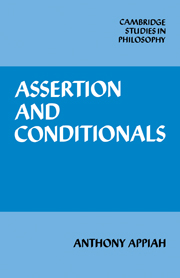Book contents
- Frontmatter
- Contents
- Acknowledgements
- Notation
- 1 Cartesianism, behaviourism and the philosophical context
- Part I Belief
- Part II Meaning
- Part III Conditionals
- 8 Indicative conditionals
- 9 Truth and triviality
- 10 Logic without truth
- 11 Generalising the probabilistic semantics of conditionals
- Epilogue
- Bibliography
- Index of names
- Index of key terms
10 - Logic without truth
Published online by Cambridge University Press: 07 October 2011
- Frontmatter
- Contents
- Acknowledgements
- Notation
- 1 Cartesianism, behaviourism and the philosophical context
- Part I Belief
- Part II Meaning
- Part III Conditionals
- 8 Indicative conditionals
- 9 Truth and triviality
- 10 Logic without truth
- 11 Generalising the probabilistic semantics of conditionals
- Epilogue
- Bibliography
- Index of names
- Index of key terms
Summary
Hypothesis: in a situation where a reasoner must reason from somewhat uncertain or fallible premises, he should want to reason in accord with principles that lead from probable premises to probable conclusions – because he wants to arrive at probable conclusions.
(Adams, 1975: 1)ADAMS AND THE VALIDITY OF CONDITIONAL INFERENCES
From the fact that indicative conditionals have no truth conditions, conventional wisdom will have us inferring that they have no logic. On a standard definition, which I relied on in 8.2, a sentence S follows from a class P of premises iff it is not logically possible for the members of P to be true and S to be false. But this way of thinking surely concedes too much to one modern conception of the function of logical theory. For on the traditional conception logic is the study of reasonable argument; and indicative conditionals show up in arguments both good and bad, so that something needs to be said about how we tell which is which. A theorist of argument who said nothing about indicative conditionals, just because they have no truth-values, would be avoiding a central and familiar class of cases. Indeed, we might well respond by denying that someone whose theory cannot tell us that modus ponens is an acceptable form of argument and affirming the consequent is not, understands what an argument is at all.
- Type
- Chapter
- Information
- Assertion and Conditionals , pp. 213 - 233Publisher: Cambridge University PressPrint publication year: 1985

